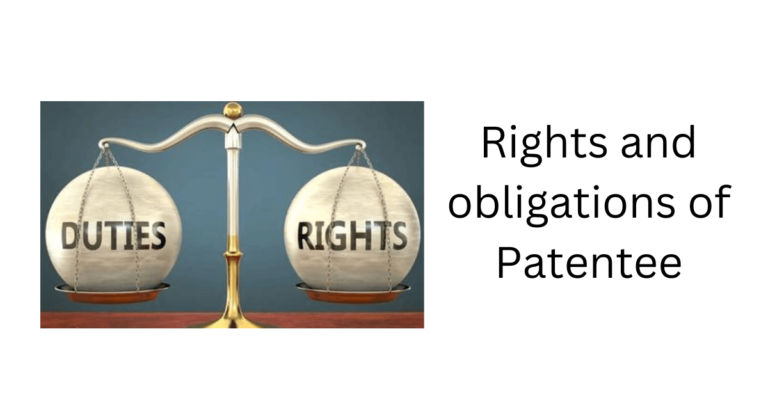When an invention is patented, the patentee is granted numerous important legal rights. Sadly, many inventors and business owners still don’t grasp how to use and effectively exercise their rights as patent holders, despite the growing awareness of intellectual property and the value it has for enterprises. If someone is proven to be copying your idea, having the proper knowledge of patent rights allows you to take the appropriate action. To protect their creation from copycats, Indian inventors are required to file a patent application under the Patents Act, 1970. The same piece of legislation confers certain obligations and rights on the patentee.
Table of Contents
ToggleWhat is a patent?
A patent is a particular privilege granted to the creator of a novel idea. He can take advantage of his patent rights up until the end of the patent’s term.
Who is Patentee?
A patentee is the individual who creates a new product, an enhancement to an existing product, or a brand-new method of producing an existing product.
Rights and obligation of the Patentee:
In India, patentees are given specific rights and obligations upon the issuance of the patent. The Patent Act grants the patentee specific rights, so that he can make profit out of his patent.
What are the rights of patentees?
1. Exclusive right:
The exclusive right to patent is provided by Section 48 of the Patent Act of 1970. As is well known, a patent can cover either a method or a product. By prohibiting the patent in both cases—whether it involves a product or a process—Section 48 grants exclusive rights.
- If a product is the subject of the patent manufactured by the patentee, the exclusive right to patent prohibits third parties from manufacturing, putting up for sale, selling, importing, or using the product developed by the patentee without his approval.
- If the patentee has obtained a patent for a method, the patentee’s exclusive right prohibits third parties from using, selling, or importing the product made using that method without the patentee’s permission.
2. Right to Exploit the Patent:
In India, the right to produce, use, market, and distribute the patented goods is granted to the patent holder. If the innovation involves a manufacturing method, the patentee has the right to assign the process to another individual who has been given their permission. The agent of the patent holder may exercise this authority.
3. Right to Assign and License:
The power to assign or give license to third parties for the purpose of producing and distributing the patented goods is provided to the patent holder under Section 69(5) of the Patent Act of 1970. For a patented product with multiple patent owners, all patent owners must concur to grant the license to a third party collectively. The license is not considered to have been issued until the administrator has correctly authorized the request. Thus, for the assignment or license to be legal and valid, it must be in writing and submitted to the Patent Authority.
4. Rights to surrender:
The patent holder has the right to give up his patent after requesting approval from the controller. After that, in compliance with the Indian Patents Act, the controller advertises this surrender. The controller can then be contacted by those who are eager to own a patent. The controller looks into the parties’ claims and gives up ownership if necessary.
5. Right before selling:
A patent is sealed from the date of notification for acceptance until the date of acceptance of the notification, as per Section 24 of the Indian Patents Act. After the notification of acceptance is presented, the patentee’s rights are in effect.
6. Right to Sue For Infringement:
Any violation of the rights of a patent holder is referred to as a patent infringement. In the event that their rights have been violated, patent holders have the option of going before either a district court or a high court. If the defendant is found guilty of infringement, the courts may award both damages and a permanent injunction.
7. Right to Apply for the Patent of Addition:
The Patents Act of 1970, sections 54 to 56, contain this clause. The provision allows modifications to the current invention. The patent holder is entitled to the enhanced innovation in these circumstances as soon as the notification of approval is made public. When the notification is presented, the owner is awarded the same rights as those of the earlier patent.
What are the obligations of patentees?
1. Duty to Disclose the Patent:
It is the patentee’s responsibility to provide the controller with all information that is required. The applicant must reveal the innovation to the public, according to Section 8 of the Patent Act of 1970. At the time of filing a patent application or within six months of applying, the patentee is categorically required to disclose all necessary information regarding the remote application of an identical or nearly identical invention that has been documented, according to Section 8(1) of the Patent Act of 1970.
2. Duty to request for examination:
The patent registration process does not provide for any type of scheduled examination for the grant of a patent application, in contrast to other intellectual property rights. According to section 11(B) of the Patents Act of 1970, it is the patentee’s responsibility to ask the Controller to look at how the patent has developed or grown.
3. Duty to respond to objections:
The Patent Controller sends the inspection request to an analyst, who evaluates the growth before sending the First Examination Report (FER) back to the Patent Controller. In some cases, the First Examination Report will mention some objections. Responding to such reports of objection is required of patentees. They must also communicate within a year after the FER’s issuance. The patentee’s application will automatically be rejected if this is not done.
4. Duty to clear all objections:
It is the applicant’s responsibility to address any and all complaints and oppositions made against his invention, as well as to respond to such objections. If the controller is still unsatisfied, he could also request a meeting. Additionally, it is the applicant’s responsibility to attend the consultation and address all objections and oppositions (if any have been lodged) made against the invention.
5. Duty to pay statutory fees:
To be eligible for a patent, patentees must also pay any statutory fees connected to the registration process. If the payment is not made, the patent will not be considered for the grant. Section 142 of the Patent Act addresses the payment of appropriate fees and the penalties of failing to pay certain costs.
Conclusion
According to the Patent Act of 1970, the patentee receives a number of rights and duties in addition to receiving a patent. In light of this, it is essential that the patentee adhere by the rights and obligations set forth in the Patents Act of 1970.






